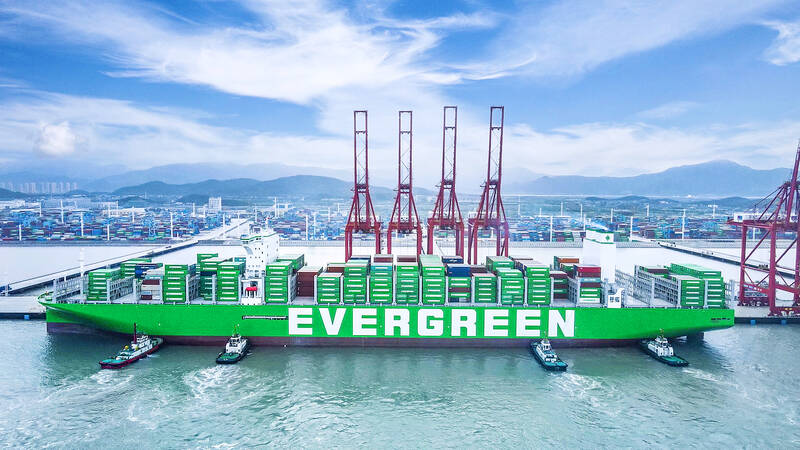Evergreen Marine Corp (長榮海運) gave a conservative profit growth outlook for this quarter, as demand and freight rates retreated amid a strong US dollar and surging inflation, but its full-year profit could exceed that of last year, president Eric Hsieh (謝惠全) told an investors’ conference in Taipei yesterday.
The shipper’s third-quarter revenue grew 19 percent to NT$169 billion (US$5.3 billion), slower than an annual expansion of 75 percent in the second quarter and 91 percent in the first quarter, company data showed.
“The third quarter is historically a peak season for shipping, but freight demand last month plunged due to surging inflation. We do not expect a quick rebound this quarter, unless the inflation issue is resolved,” Hsieh said.

Photo courtesy of Evergreen Marine Corp
Nonetheless, Evergreen should be able to stay in the black this quarter, with profit this quarter possibly surpassing that of the same period last year, he added.
With the Shanghai Containerized Freight Index, which reflects spot freight rates on major routes, further declining this week to 1,814 yesterday, Hsieh said that Evergreen is facing pressure from some clients to reduce rates.
Clients, especially those from American and European markets, have asked that the gap between their contract rates and spot rates be reduced, and Evergreen has discussed the issue with them on a case-by-case basis, he said.
Most clients in Asian markets are sticking to their contracts, he added.
Average shipping rates slid to US$2,529 per twenty-foot-equivalent unit last month, falling for the second straight month from US$2,978 in July, compared with a peak of US$3,222 in February, company data showed.
The improvement in congestion at seaports worldwide might have helped lower shipping rates, and the average punctuality rate has recovered to about 45 percent — albeit still far below the pre-COVID-19 level of 70 percent, he said.
Evergreen is conservative, but not pessimistic about next year, Hsieh said, adding that he does expect a net loss next year.
Demand for shipping would be affected by inflation and Russia’s invasion of Ukraine, but global economic growth is forecast to remain in positive territory, Hsieh said.
Even though global shipping capacity would rise next year as shippers receive new vessels, growth would be limited by the implementation of new environmental regulations, or the Carbon Intensity Indicator, Hsieh said.

Nvidia Corp chief executive officer Jensen Huang (黃仁勳) on Monday introduced the company’s latest supercomputer platform, featuring six new chips made by Taiwan Semiconductor Manufacturing Co (TSMC, 台積電), saying that it is now “in full production.” “If Vera Rubin is going to be in time for this year, it must be in production by now, and so, today I can tell you that Vera Rubin is in full production,” Huang said during his keynote speech at CES in Las Vegas. The rollout of six concurrent chips for Vera Rubin — the company’s next-generation artificial intelligence (AI) computing platform — marks a strategic

Enhanced tax credits that have helped reduce the cost of health insurance for the vast majority of US Affordable Care Act enrollees expired on Jan.1, cementing higher health costs for millions of Americans at the start of the new year. Democrats forced a 43-day US government shutdown over the issue. Moderate Republicans called for a solution to save their political aspirations this year. US President Donald Trump floated a way out, only to back off after conservative backlash. In the end, no one’s efforts were enough to save the subsidies before their expiration date. A US House of Representatives vote

Shares in Taiwan closed at a new high yesterday, the first trading day of the new year, as contract chipmaker Taiwan Semiconductor Manufacturing Co (TSMC, 台積電) continued to break records amid an artificial intelligence (AI) boom, dealers said. The TAIEX closed up 386.21 points, or 1.33 percent, at 29,349.81, with turnover totaling NT$648.844 billion (US$20.65 billion). “Judging from a stronger Taiwan dollar against the US dollar, I think foreign institutional investors returned from the holidays and brought funds into the local market,” Concord Securities Co (康和證券) analyst Kerry Huang (黃志祺) said. “Foreign investors just rebuilt their positions with TSMC as their top target,

REVENUE PERFORMANCE: Cloud and network products, and electronic components saw strong increases, while smart consumer electronics and computing products fell Hon Hai Precision Industry Co (鴻海精密) yesterday posted 26.51 percent quarterly growth in revenue for last quarter to NT$2.6 trillion (US$82.44 billion), the strongest on record for the period and above expectations, but the company forecast a slight revenue dip this quarter due to seasonal factors. On an annual basis, revenue last quarter grew 22.07 percent, the company said. Analysts on average estimated about NT$2.4 trillion increase. Hon Hai, which assembles servers for Nvidia Corp and iPhones for Apple Inc, is expanding its capacity in the US, adding artificial intelligence (AI) server production in Wisconsin and Texas, where it operates established campuses. This